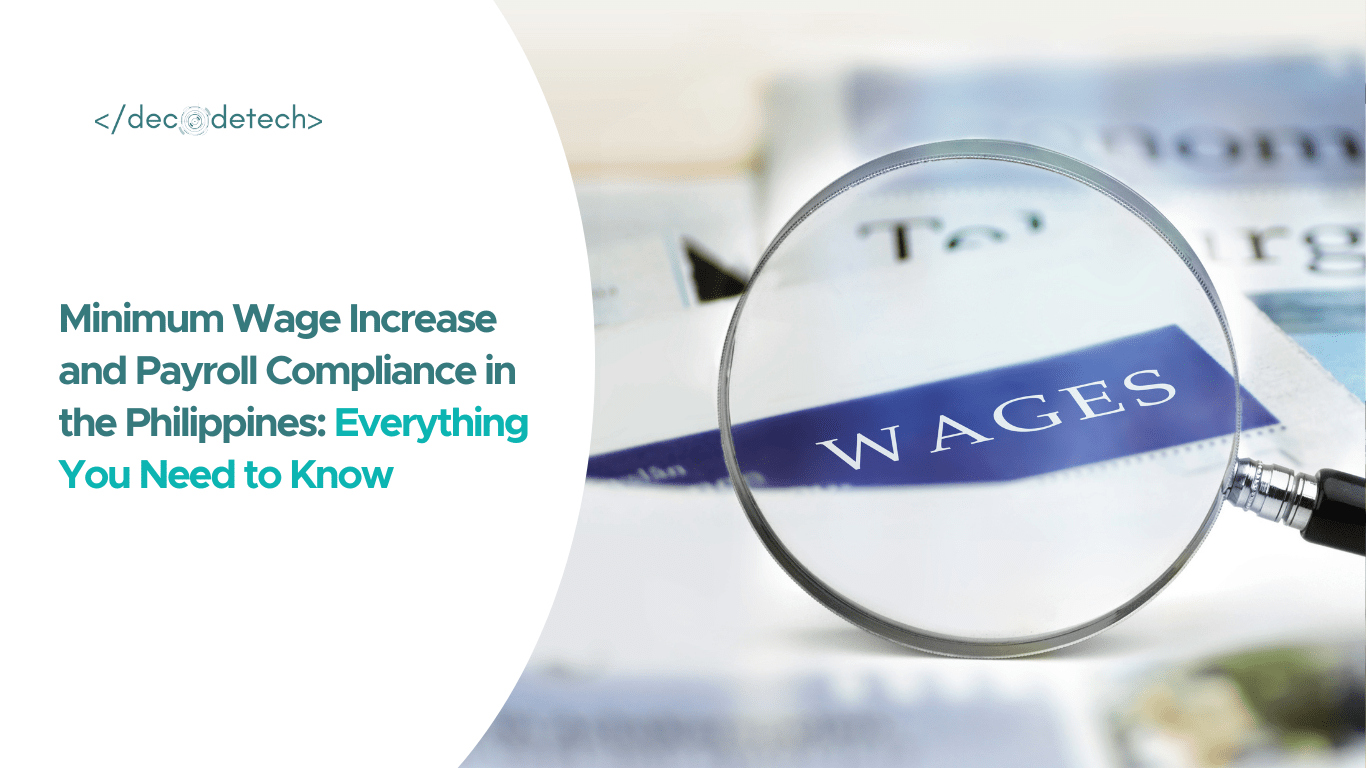Business Insights, HR and Payroll Tips and How-To
Minimum Wage Increase and Payroll Compliance in the Philippines: Everything You Need to Know
26 Aug

Minimum wage is more than just a number, it sets the baseline for worker compensation and directly impacts payroll, benefits, and overall employment costs. In the Philippines, where regional wage boards implement increases periodically, staying compliant is a key responsibility of every employer.
A wage hike doesn’t just affect frontline employees, it can cause a ripple effect across job levels, especially in small to medium-sized businesses.
Recent Minimum Wage Increases in the Philippines
The most recent minimum wage increases in Metro Manila (NCR) took effect on July 18, 2025, under Wage Order No. NCR-25, which approved a ₱50 daily increase. This brought the new daily minimum wage to:
- ₱695 for the non-agriculture sector
- ₱658 for the agriculture sector
This wage adjustment is expected to benefit over 1 million minimum wage earners in the region, excluding those working in domestic and informal sectors.
Other regions across the Philippines are also undergoing wage reviews, with several regional boards holding public consultations to determine possible increases in line with inflation, rising cost of living, and input from labor and employer groups.
What This Means for HR and Payroll Teams
For SMEs, using a cloud-based HR and payroll system isn’t just about saving time, it’s about survival. Many small teams don’t have dedicated HR staff. That’s why automation is no longer optional.
Modern HRIS platforms allow you to:
- Store data securely
- Automate routine tasks
- Track leave and time logs
- Onboard new hires with ease
- Improve compliance with local labor laws
Most importantly, a good HRIS helps with payroll computation Philippines standards, automatically calculating deductions for SSS, PhilHealth, Pag-IBIG, and taxes. So, you can pay your people right, without headaches.
The recent wage hike has several implications for HR and payroll professionals. Here’s how it affects their daily operations:
System and Policy Adjustments – HR and payroll teams must update payroll systems to reflect the new rates, ensuring accuracy in salaries, benefits, and deductions moving forward.
Budget Reassessment – Businesses may need to revisit their compensation budgets to accommodate the increase. This can impact workforce planning, hiring, and employee benefits allocation.
Stricter Compliance Monitoring – With new wage rules in place, there’s increased pressure to remain compliant with DOLE regulations. Failure to do so may result in penalties or legal issues.
Employee Communication – Clear and timely communication of the wage changes helps manage expectations and maintain employee trust, especially among minimum wage earners.
Documentation and Recordkeeping – Payroll teams must update employee records, payslips, contracts, and BIR reports to reflect the new wage rate, ensuring alignment with government audits.
How HRIS and Payroll Systems Help
An automated HRIS (Human Resource Information System) and payroll platform simplifies all of the above. Here’s how:
Automated Payroll Adjustments – Modern systems can automatically apply the updated minimum wage rates across all affected employees, reducing manual errors.
Accurate Compliance Tracking- Built-in compliance features help ensure payroll processing aligns with labor laws, minimizing the risk of penalties or missed requirements.
Real-Time Reporting and Analytics – HRIS tools provide updated reports that help businesses assess the impact of wage adjustments on their overall payroll costs.
Efficient Employee Communication – Employee portals allow HR to easily share updates on salary changes, payslips, and related announcements in one place.
Centralized Data Management – With all employee records stored and updated in a single system, HR teams can manage contracts, timekeeping, and payroll seamlessly and with less paperwork.
By integrating wage updates into your system automatically, businesses reduce errors, save time, and stay compliant without the manual headaches.
How Decode Technologies Makes Compliance Easier
With Decode Technologies’ HRIS and Payroll System, staying compliant with Philippine labor laws becomes more manageable for HR and payroll teams. The platform automates complex processes and provides the tools and support needed to meet government requirements accurately and on time.
HRIS Integration:
Seamless adjustments to employee contracts and payslips: Easily reflect policy or rate changes without affecting past records.
Notifications and reminders for compliance deadlines: Never miss a BIR, DOLE, or SSS deadline with built-in alerts.
Support Services:
Dedicated assistance for setup and troubleshooting: Decode’s customer support team helps ensure you’re always running smoothly, even during system changes or updates.
With compliance requirements becoming more complex, HR and payroll professionals can’t rely solely on spreadsheets and manual workflows. The right system can take the guesswork out of compliance, protecting your organization from risks while saving time and resources.
Decode Technologies is here to support you every step of the way.
Recent Posts
- Organized Recruitment Process: How Structured Hiring Improves Outcomes February 7, 2026
- Unlocking Potential in 2026: How AI Assistants Boost Business Efficiency January 29, 2026
- Switching Payroll Providers in Manufacturing: What PH Businesses Should Evaluate 2026 January 27, 2026
- Applicant Tracking System Explained: How Philippine Businesses Improve Hiring in 2026 January 23, 2026
- AI Chatbot and Callbot Made Simple: Their Growing Role in Business Operations in 2026 January 22, 2026